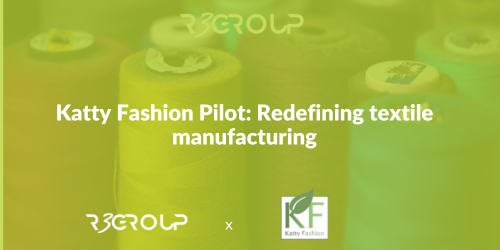At the heart of North East Romania, Katty Fashion has spent the last two decades building a reputation as a forward-thinking manufacturer in the European fashion ecosystem. Founded in 2003, this SME has grown into a trusted partner for more than 50 European brands, specializing in collaborative design, product development, and bespoke garment manufacturing. Rooted in a family tradition spanning three generations of textile and clothing engineers, Katty Fashion combines craftsmanship with a vision for the future.
Today, that vision is closely aligned with the goals of the R3GROUP project, where Katty Fashion plays a pivotal role as a pilot site. While R3GROUP explores next-generation manufacturing capabilities across sectors, Katty Fashion brings the perspective of the textile industry—one where flexibility, sustainability, and rapid response are vital to staying competitive.
Addressing the Need for Agile Production
Operating in a fast-paced, small-batch production environment, Katty Fashion faces daily challenges in adjusting to new styles, custom designs, and frequent production changeovers. The R3GROUP pilot aims to enhance the company’s production reconfigurability—streamlining the ability to switch between styles and reducing the downtime and inefficiencies associated with retooling.
By digitizing key aspects of production planning and introducing data-driven workflows, the pilot is expected to bring improvements in:
-
Reducing lead times for new product lines
-
Increasing responsiveness to fluctuating customer demands
-
Lowering changeover costs and minimizing production delays
These improvements are not only critical for maintaining competitiveness in the fashion industry but also serve as a blueprint for reconfigurable manufacturing in other sectors.
Tackling Textile Waste and Material Challenges
Unlike plastic injection molding, where raw materials can often be melted and reused, textile manufacturing deals with non-recoverable material waste, making optimization crucial. Katty Fashion, through R3GROUP, is exploring new ways to improve material traceability and usage efficiency.
Key efforts include:
-
Enhancing material planning to reduce offcuts and surplus
-
Exploring the feasibility of integrating recycled textiles
-
Developing better systems for lifecycle management of fabric waste
The challenges outlined above are being analyzed and redefined by R3GROUP project partners, including Sqetch, Made2Flow, and Gheorghe Asachi Techical University of Iasi . These teams are working closely with Katty Fashion to implement cutting-edge digital planning tools that will transform production workflows.
These steps are part of the company’s broader commitment to sustainability and ethical manufacturing—core principles that align with the R3GROUP mission.
At Katty Fashion, we embrace innovation to navigate the challenges of bespoke manufacturing. Through the R3GROUP project, we are exploring how digitalization and adaptive production strategies can enhance flexibility, efficiency, and sustainability in the textile industry.”
Creating Impact Beyond the Textile Sector
The solutions being tested—particularly those related to digitalized production planning, reconfiguration efficiency, and material management—have clear cross-sector value. The insights gained could easily be adapted to other manufacturing environments where agility, customisation, and waste reduction are key success factors.
Looking Ahead: The Factory of the Future
As part of its long-term strategy, Katty Fashion is embracing innovation not only as a competitive advantage but as a responsibility. Participation in European initiatives like R3GROUP reflects the company’s commitment to evolving toward a Factory of the Future—one that is digital, sustainable, and resilient.
Through the R3GROUP pilot, Katty Fashion is showing how even traditional industries like fashion can lead in reconfigurable, resource-conscious manufacturing. Their journey offers valuable lessons for any sector looking to balance flexibility with sustainability in the face of an ever-changing industrial landscape.
